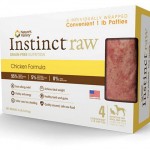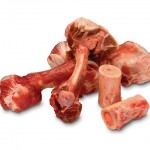I would guess that very few people are aware of the connection between dental health and the benefits provided for good cardiovascular health. The dental industry has changed over the last few decades, and with the knowledge gained from research and preventive dentistry, the incidence of heart disease has been reduced. The slogan ‘ Good Food, Great Teeth’ is ever so true for pets as well as humans.
Pets that are in the infant stage at 2 to 6 weeks of age start their teething issues when the deciduous teeth erupt through the gums, which gives rise to pain and inflammation. It is at this time when the naughty puppy stage begins, and they will chew on whatever they can find to relieve the pain.
It is my recommendation that puppies chew on a raw meaty bone instead. This provides a more effective teething aid. Gnawing on a raw meaty bone requires effort and the neck and jaw muscles strengthen accordingly. This provides a good opportunity to educate the puppy on how to deal with natural food.
As our pets develop, they are able to crunch on larger pieces and this coincides with the increased need for calcium. More importantly, this process provides vigorous cleaning of the oral cavity. Munching on a natural raw meaty bone will also help to dislodge deciduous teeth and help to heal damaged gums. Using this as a regular routine, the teeth will develop properly and provide better lifelong oral health.
Just as the stool is an excellent barometer of good health, inspection of the oral cavity is a prevention method for eliminating cardiovascular problems. Many of our customers remark on the improvement of doggy breath once they have made the change to feeding raw meaty bones. Severe plaque build-up, sore and bleeding gums, and even calculus can easily be removed with a few meals of raw meaty bones.
Pet dentistry has become big business. Vets are recommending teeth cleaning, which requires sedation and costs that are prohibitive. The need for a dental cleaning can almost always be prevented through routine oral care. The majority of pets fed processed kibble diets will eventually need dental treatment.
Research on the gum disease-heart disease connection in dogs is the result of similar studies with humans. Those studies suggest that people with periodontal disease are twice as likely to have coronary artery disease and other heart conditions, than people with healthy gums. This is an especially important area of study in dogs because 75 percent of canine companions have gum disease by the time they reach middle age.
When comparing human to pet dentistry, the difference is the time factor. By the time an animal is presented for treatment, the periodontal disease is often advanced and has seriously affected the patient’s general health. Veterinarians have long suspected that, and research supports the fact, that periodontal disease can become systemic and can predispose the animal to problems such as heart failure, liver and kidney failure, and bone marrow depression. As the disease progresses, the symptoms worsen creating halitosis, difficulty in eating, hemorrhaging, and oral discomfort. In fact, I find many dog guardians that consider halitosis an acceptable condition with their dog. They think it is just the way their dog’s breath is supposed to be. The bacteria from this reservoir of infection in the mouth readily enter the blood system, and thus get spread to other organs, commonly the heart, liver, and kidneys.
Without good dental hygiene, most pets will exhibit signs of dental problems within the first three years of their life. In my experience working with raw meat diets for 37 years, I can attest to the fact that eating a natural raw meat diet, rather than a heat processed food, will provide the improved oral health needed to suppress the spread of unwanted harmful bacteria to the other organs of the body. It is rare to find a meat fed dog that exhibits the doggie breath of a kibble fed dog. Maintaining proper oral health offers evidence to the claims we make for extended pet longevity. I thus, expand the slogan—‘Good Food, Great Teeth, Grants Good Health.’
About
Robert Mueller, BSc, Pharm. is a registered pharmacist, author of “Living Enzymes: The World’s Best Kept Pet Food Secret“. He and his wife love to travel around the world with their dog, Moxie – a Yorkshire Terrier/Maltese mix.











